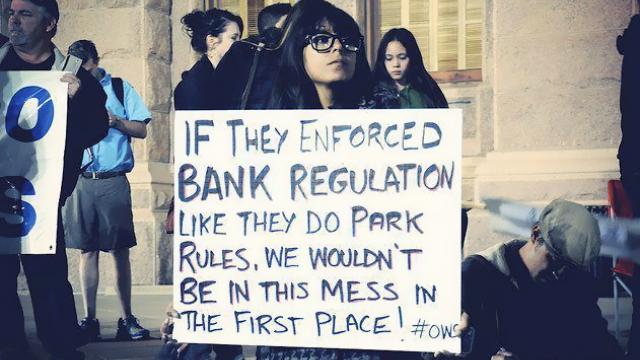
Photo: Forget the Box
There are two kinds of wealth. There is the wealth that is earned when commodities, products, labor services or talents are brought into a competitive fair market and those offerings are rewarded. This is capitalism at its ideal. But there is also the wealth stolen when markets are corrupted—when wealth is taken by unfairly disadvantaging competitors, or by fraud, or by the abuse of public trust. This type of wealth is a market cancer, for it knows no ethic. It spreads by leveraging itself. This wealth will seek to increase market inequities by influence and by corruption until it has impoverished the very many for the benefit of the very few. This is capitalism at its most predatory.
In this sense, Occupy Wall Street is not a socialistic movement as some accuse, but rather it is a fair-market movement in the best of American traditions. Occupy Wall Street does not oppose wealth; it opposes predatory wealth.
There are also two kinds of public debt. There is the debt incurred by funding the needs of the common defense, infrastructure, education, regulation of air travel and foods, court system, support to the disadvantaged, and so on. Few object to paying taxes for these common needs. But then there is the debt incurred when markets are corrupted so that profits are made private and costs public. And this debt—the public debt generated by corrupted markets—is likely greater that the debt of the common good.
When a chemical or mining or logging operation is allowed to bring goods to market while dumping wastes in the environment, then profit has been made private and costs public. When a coal-burning power plant discharges toxins into the atmosphere so that individuals downwind are subject to increased risks of asthma and their children to birth abnormalities, then profit has been made private and terrible costs public. When a mortgage/banking industry generates toxic securities, then corrupts rating agencies though influence so that those toxic securities are classified as hazard-free in order that they might be fraudulently marketed to conservative investors such as the pension funds of wage-earners, then profit has been made private and the dire costs public. When the CIA is used as a market tool—to destabilize elected governments in favor of market-cooperative puppets—then immense profits flow to a very few for brief time. But when the disenfranchised revolt, as they have in Latin America and in the Middle East, then grim costs of foreign market manipulation is made wholly public—both in war’s appetite for vast treasure and in the populations sacrificed by war to needless death and disability.
To be sure, entitlements too can distort markets. But to abet market inequities as Congress has, to reward market criminality as Congress has, and then to suggest that eighty years of Social Security surpluses are the source of the nation’s debt and the economy’s ills as some in Congress do is spectacularly dishonest. It’s as if a tribunal of equatorial generals condemn the children that they have provided with machetes for the atrocities of ethnic war.
For the past decade both domestically and overseas we have suffered the appalling consequences of a public wealth transfer, in nearly inconceivable magnitudes, into private vaults by the corrupted markets that are often created or supported by Washington. These practices must end. As our presidential candidates struggle to find a way forward, perhaps they can consider a return to moral governance: to honestly regulated, competitive fair-markets. They could begin by truthfully acknowledging the realities of the recent past—in which oxen have been gored, and oxen fattened—rather than searching for economic scapegoats. Then it might be possible to see a pragmatic means by which the costly and too common market distortions can be righted.
3 WAYS TO SHOW YOUR SUPPORT
- Log in to post comments













